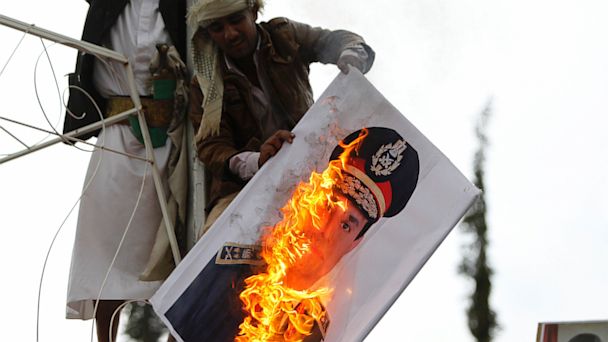U.S. Envoy Arrives in Cairo Amid Fresh Protests

Mohamed Al-Sayaghi/Reuters
Amid heightened political tension following the ouster of Egyptian President Mohamed Morsi earlier this month, a senior U.S. official has touched down in Cairo to hold high-level talks with Egypt's military and political leaders.
T he State Department said Deputy Secretary of State William J. Burns "will underscore U.S. support for the Egyptian people, an end to all violence, and a transition leading to an inclusive, democratically elected civilian government." The State Department did not specify exactly who the deputy Secretary will meet with during his two-day visit.
Thousands of Morsi supporters have vowed to take to the streets today to escalate pressure on the military. Exactly one week after the military killed at least 51 Morsi supporters outside the Republican Guard officers' club in Cairo, the Brotherhood refuses to recognize the military's caretaker government.
In a sign of deepening polarization, state media reported Sunday night that Egypt's public prosecutor ordered a freeze of the financial assets of 14 top Brotherhood officials, including the Brotherhood's Supreme Guide Mohammed Badie, who is believed be in hiding, and the former speaker of Parliament, Saad el-Katatni. The freeze also included the group's chief financial backer, Khairat El-Shater, a millionaire businessman.
The legal action against the Brotherhood followed a televised speech by Egyptian military chief, Gen. Abdel-Fattah el-Sissi who defended the military's decision to intervene, saying he was responding to "the will of the people."
"The Armed Forces receive [commands] from the people rather than dictating them," Sissi said, in his first public comments since Morsi's ouster.
Speaking to a room full of military generals, Sissi said Morsi had violated his popular mandate and lost his legitimacy forcing the military to "make a choice."
"The Armed Forces had decided, without any reservation, to be at the service of the people and to empower their free will," Sissi said, emphasizing that military control was only temporary. "The Egyptian military is preparing to complete its work and is apolitical," he said.
Sissi, who will remain Egypt's defense minister for now, also said both the military and former Prime Minister Hashem Qandil had suggested separately to Morsi that he field a referendum on early presidential elections. "Our request was met with absolute rejection," he said.
Muslim Brotherhood spokesman Gehad El-Haddad swiftly dismissed Sissi's speech.
#Sisi hs no right 2 decide which protest is worthy enough 2 represent ppl. Ppl choose thru ballot box. #AntiCoup #ProDemocracy
- Gehad El-Haddad (@gelhaddad) July 14, 2013
#SCAF & #Sisi hv no right to act on behalf of ppl of #Egypt except thru orders of their elected commander in-chief Prez #Morsi. #ProDemocracy
- Gehad El-Haddad (@gelhaddad) July 14, 2013
On Monday, Egypt's Prime Minister-designate Hazem El-Beblawi forged ahead with new cabinet nominations. State media reports as many as 30 ministers may join the interim government but Beblawi must make the process appear inclusive. Beblawi is largely expected to name liberals and technocrats but says he hasn't ruled out Brotherhood members.
"If someone is named from [the Brotherhood's] Freedom and Justice Party, if he is qualified for the post he may be considered," he said last week. "I'm taking two criteria for the next government: efficiency and credibility."
Over the weekend, liberal opposition leader and Nobel Peace Prize-winner Mohamed ElBaradei was sworn in as the vice president for international relations, and former Egyptian ambassador to the U.S. under former President Mubarak, Nabil Fahmy reportedly accepted the post of foreign minister. The full cabinet roster is expected to be announced on Wednesday.